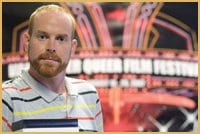In the absence of queer content in BC’s compulsory high school curriculum, a queer arts organization wants to incorporate its established film-and-discussion program into mandatory Planning 10 coursework to fill what it sees as a significant gap.
“I think it’s important to stress there’s still a lot of gaps currently in the curriculum where queer students aren’t being included in the curriculum. And that’s happening cross-curricula, not just in certain classes,” says Out in Schools coordinator Ross Johnstone.
Most school boards don’t even address homophobic harassment in their codes of conduct, he points out. “When it comes to people being bullied and people being assaulted in schools, that’s not down on paper.
“I think the importance of us penetrating curriculum is to ensure essentially that there are healthy and safe schools for everybody to learn in,” Johnstone emphasizes.
He says the idea to focus on Planning 10 emerged almost simultaneously from two quarters: interest expressed by Planning 10 school counsellors already familiar with Out in Schools’ film-and-discussion program; and a recommendation from the Vancouver School Board’s Pride committee to pitch it as a Planning 10 module.
In addition, Johnstone notes, polls of teachers and students from schools that have hosted Out in Schools presentations show that Planning 10 is the usual answer to the question about where the presentations might fit into the curriculum.
The learning outcomes identified in the Planning 10 curriculum, specifically the ones about fostering healthy relationships and critically examining media images and content, are areas that Out in Schools facilitators usually focus on in their post-film discussions in classrooms, says Johnstone, noting that not much program tweaking was necessary to meet Planning 10 requirements.
“Ultimately, what we want to do is get conversations about sexuality [going], and expose people who don’t have a lot of experience with the LGTB community, and let them know that this is a community they’re going to come into contact with whether it’s friends, family, parents, teachers, employers, employees,” Johnstone explains.
Asked about the education ministry’s involvement in this initiative, Johnstone says it’s been mostly in an advisory capacity, particularly on the question of how Out in Schools should modify its program “to make a pitch to the ministry when they’re thinking about reviewing their curriculum.”
A test run of the program as a Planning 10 unit is underway in the Vancouver school district, says Johnstone, indicating that he’s planning to pitch the program’s official addition to Planning 10 in September 2008 —once it’s had “a couple of semesters of testing within Vancouver.”
Education activist Jane Bouey, who sits on the Vancouver School Board’s Pride committee, says it’s her understanding that if the education ministry accepts the queer film unit, it will be made available provincewide.
“I think that’s the hope because that’s where the need is the greatest —it’s around the province,” says Bouey.
“I think it’s an extraordinarily important development, and I’m really supportive of it and hope that we can help it develop in a way that it will be accepted as a unit.”
Asked what guidance the education ministry gave Out in Schools, curriculum director Pierre Gilbert tells Xtra West he isn’t aware of it, or if anyone spoke to Johnstone. “I am director of curriculum here and normally I would have known, but he may have spoken to one of my staff.”
Gilbert adds that Planning 10 was revised two years ago and there are no plans to review it again anytime soon.
In settling the Corren complaint about the omission of queers from BC’s curriculum last spring, the government acknowledged that queers are excluded and promised to develop gay-friendly guidelines to help ministry staff evaluate course content in their regular curriculum reviews.
Asked about those gay-friendly guidelines, Gilbert refers Xtra West to the ministry’s public affairs bureau.
A day later, ministry spokesperson Lara Perzoff says the guidelines are “a work in progress.”
According to the Corren settlement, they were supposed to be finalized last September.
For her part, Bouey says she hasn’t heard “anything new on that at all.”
Neither can she explain what’s holding up the government’s efforts to simply add queer content to compulsory courses —even as Out in Schools pilots its own Planning 10 unit.
“I’m getting tired of guessing,” Bouey says.
Anti-homophobia consultant Glen Hansman says he hasn’t heard anything about the gay-friendly curriculum review guidelines either.
BC Gay and Lesbian Educators spokesperson Steve LeBel says it’s “a good thing” that Out in Schools is able to step up and add its own queer content.
“I hope schools, teachers, counsellors will invite them. Everyone has different priorities as to what they’re going to tackle in depth,” he points out.
“If they think it’s very important to have queer content and they’re not particularly knowledgeable, then they’ll probably go to Out [in Schools]. On the other hand, some teachers will be very knowledgeable and quite able to handle things on their own. And some will be uncomfortable to phone up someone if the word gay or lesbian was in the title of the organization. So, there’s a whole spectrum.”


 Why you can trust Xtra
Why you can trust Xtra


